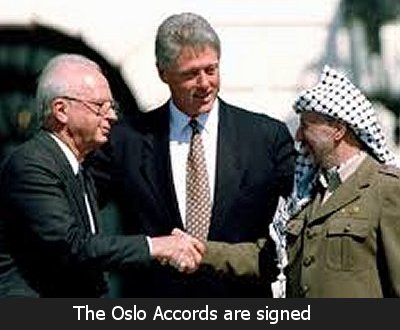
FROM NORWAY TO NOWHERE
The building and demolishing of a fragile peace accord reveals a sad truth: violence is so much easier and produces vastly quicker results than peace-making. So what effect does this have on our prayers?
Oslo is the most unlikely of stage plays. A three hour drama on the labyrinthine politics of the Middle East set round a table sounds so niche it could be put on in your living room with audience seating to spare. Yet it has had storming success on Broadway and now in the West End. A combination of smart dialogue, great acting and sharp humour (the run-away ingredients of the West Wing, after all) has led deservedly to awards.
The reprise of the secret, deniable, back-channel negotiations conducted in Norway between the Israeli government and the PLO that led to the sealing of an agreement on the White House lawn and the awkward handshake between sworn enemies Yitzhak Rabin and Yasser Arafat under the carefully choreographed smile of Bill Clinton feels so dated now as to be unreachable history. Yet it was only twenty-five years ago.
1993 was a propitious moment. The Cold War had ended and nations were realigning. Genocides in the Balkans and Rwanda were yet to unfold and the remarkably wide and strong UN coalition that ousted Saddam Hussein from Kuwait in 1991 led to the creation of a formal peace process between Israelis and Palestinians. This process was too stylised and cumbersome for lasting progress to be made but unwittingly provided cover for small, face to face negotiations to happen in Norway – a small but respected nation with no baggage to it – under the auspices of husband and wife team Terje Rod-Larsen and Mona Juul. In the British version of the play, Toby Stephens plays Rod-Larsen at odd moments for laughs like an obsequious Basil Fawlty, but there is no doubting the underlying seriousness of this couple or their achievement.
Had news of this channel leaked, the Israeli Labour government would have fallen and the Palestinians would likely have been assassinated. The stakes were vertiginously high. Watching the play, the opening exchanges between the protagonists feels like formal mediation, with each side venting their fury in ritualised ways, but you are left with the impression how important small, face to face negotiations are between people who can begin to see the humanity in the other – we all have mothers and fathers, sisters and brothers to talk about. The Israelis and Palestinians slowly begin to trust one another over a diet of waffles, creating space to discuss fundamental issues of justice and peace.
The tentative, partial agreement secured allowed a brief moment of hope to descend, until an Israeli extremist murdered twenty-nine Muslim worshippers in Hebron, resuming an endless cycle of attack and reprisal. The assassination of Yitzhak Rabin in Tel Aviv in November 1995 may be the one case of the murder of a leading modern politician that led to lasting political change, ushering in a new era of right-wing nationalism under Benjamin Netanyahu. The building and demolishing of this fragile peace accord reveals a sad truth: violence is so much easier and produces vastly quicker results than peace-making.
There is one medium at the disposal of the latter denied to the former, and that is intercessory prayer - if we took it as seriously as we might. Scripture asks us to pray for the peace of Jerusalem. In the play, the very mention of the word Jerusalem raises the temperature intolerably. So deeply symbolic is its meaning, that agreement over its status is deferred to a later point, which never came. Until, that is, President Trump chose to recognise it as Israel’s capital.
The play ends with rhetorical words about the enduring power of peace-making and posed the question, is it not possible for peace between the two peoples still to happen? I heard someone near to me in the theatre say an audible ‘no’. His voice reflected the pitiless history of the Holy Land since 1993, but it also voiced the mood of our times. There is deep cultural and political pessimism in play now. Some honesty about its effect on our prayers may be called for. Thank God he doesn’t give up on peace as easily as we do on our knees.
POPULAR ARTICLES

Obama's Covert Wars
The use of drones is going to change warfare out of all recognition in the next decades.

Through A Glass Starkly
Images of traumatic incidents caught on mobile phone can be put to remarkable effect.

What Are British Values?
Is there a British identity and if so, what has shaped the values and institutions that form it?


